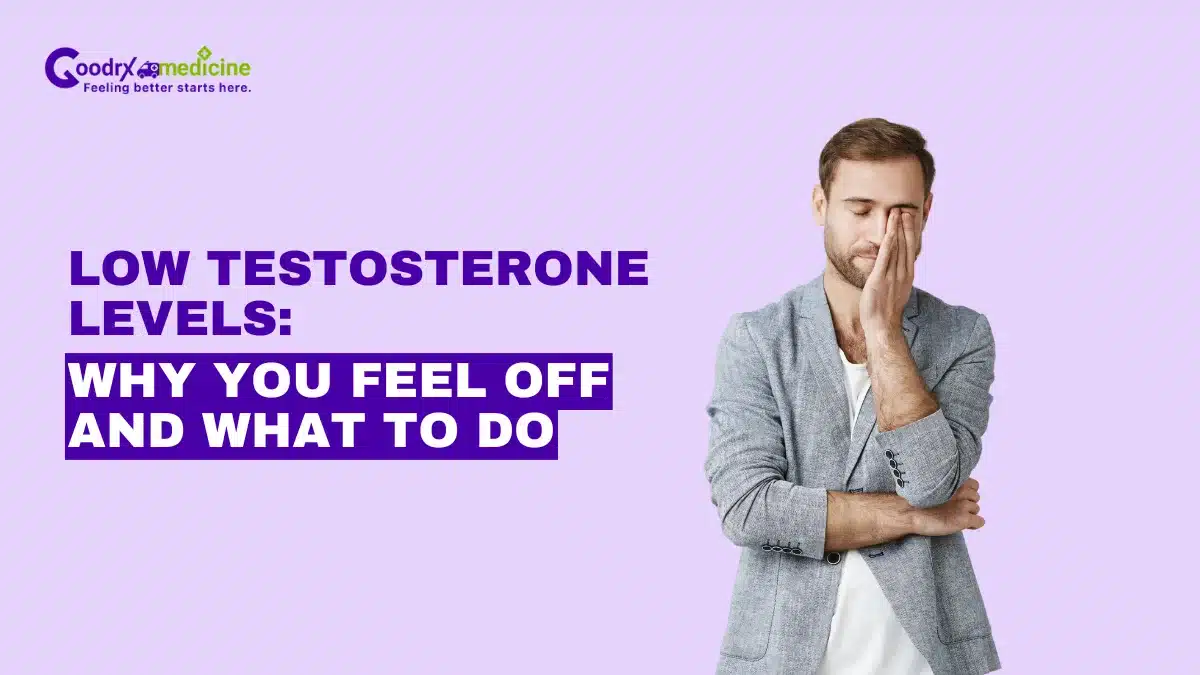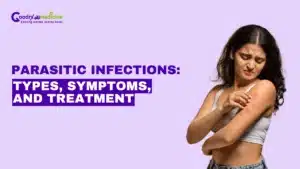Testosterone, the primary sex hormone in males, is essential in developing and maintaining male sexual traits. It is responsible for muscular mass, bone density, mood changes, and overall well-being.
Low Testosterone (low T) is a common sexual concern affecting several men worldwide. It is a condition in which the testicles do not produce enough Testosterone for healthy functioning.
Testosterone is mainly a male hormone, but is also present in women in small amounts. However, many individuals may experience Low Testosterone levels due to various factors.
While it can be a sensitive topic for some individuals, understanding low T is crucial for improving sexual health. This article explores Low Testosterone, its causes, symptoms, available treatment, and prevention.
Read on so you can address this issue and help improve your sexual confidence and intimate experiences.
What is Low Testosterone?
It is a common hormonal disorder in which the testicles do not produce enough Testosterone. It can affect both young and older men and may be caused by aging, certain medical conditions, medications, or lifestyle choices. Low blood Testosterone in men is defined as less than 300 nanograms per deciliter (ng/dL) for adults.
Women also produce small amounts of Testosterone in their ovaries and adrenal glands. For women under 50, low Testosterone is defined as a level below 25 ng/dL. Low Testosterone levels may lead to Sexual Dysfunction in both men and women.
To understand how Testosterone works, it is essential to examine how it affects both males and females. An individual can check their Testosterone levels through a blood test.
Low Testosterone symptoms
Individuals with low T may notice various physical and psychological symptoms.
The symptoms of Low Testosterone in men include sleep problems, low libido, Erectile Dysfunction, and more.
However, the symptoms in women include vaginal dryness, low sex drive, fatigue, dry skin, and more. It may also lead to Obesity, loss of muscle mass, and bone problems in both men and women.
Let’s take a closer look at the symptoms of Low Testosterone.
Physical symptoms of Low Testosterone
When Testosterone drops below the usual levels, it can cause physical issues that affect daily life and well-being. Understanding these symptoms is critical to effectively dealing with the problems caused by low T:
- Less muscle mass: Muscle mass and strength loss can impact all elements of physical performance.
- Erectile Dysfunction: Men with Low Testosterone levels may find it challenging to get and maintain an erection, which may lead to ED.
- Low libido: A drop in Testosterone levels frequently results in a decrease in sex drive and desire.
- Higher body fat and Gynecomastia: Body fat may increase due to decreased Testosterone, particularly in the stomach. Men with low T may occasionally have enlarged breast tissue (Gynecomastia).
- Fatigue: It often leads to fatigue and low energy.
Psychological symptoms of Low Testosterone
It can significantly impact one’s psychological well-being. Emotional symptoms like mood swings, irritation, and general uneasiness are common indicators.
- Mood swings: It can cause feelings of sadness, irritability, and mood swings.
- Sleep disturbance: Insomnia or poor sleep habits may accompany Low Testosterone levels.
- Lack of motivation: It causes some individuals, especially older men, to lose motivation and have trouble focusing and remembering things. They often need support or treatment to improve these cognitive functions.
What causes Low Testosterone?
Knowing the causes of Low Testosterone levels is vital for efficient management solutions. There are several causes of low T, including natural and medical processes.
This section will focus on the causes of Low Testosterone levels in detail:
- Medical conditions: It can be caused by various medical issues, including Obesity, Diabetes, and hormonal imbalances.
- Unhealthy lifestyle: Unhealthy lifestyle choices can substantially impact hormonal imbalances.
- Aging: Testosterone levels begin to decline after the age of 30 naturally at a rate of 1% per year. For women, the drop usually starts happening during Menopause. However, even younger individuals can experience the condition.
A poor diet, a lack of exercise, and excessive stress are examples of risk factors.
Causes of Low Testosterone levels in men
What causes a low level of Testosterone depends on your type of Hypogonadism. There are two types of Hypogonadism in men:
- Primary Hypogonadism
- Secondary Hypogonadism
Primary Hypogonadism or primary testicular failure refers to a problem in the testicles. The causes of Primary Hypogonadism include Cancer treatment, chemotherapy, normal aging, and more.
On the other hand, Secondary Hypogonadism is due to a problem with the pituitary (a part of the brain). The causes of Secondary Hypogonadism include HIV/AIDS, medication interactions, Obesity, and more.
Causes of Low Testosterone levels in women
Testosterone is an essential hormone for women, though in small amounts. The causes of low T in women include aging, chronic stress, poor diet, lack of exercise, and inadequate sleep. However, some women may genetically produce Low Testosterone levels.
Treatment for Low Testosterone
If low T levels persist, seek medical treatment. Options include Testosterone Replacement Therapy (TRT), lifestyle changes, and natural remedies to improve symptoms and overall well-being.
One can consult a doctor for prescription ED medicines like Viagra, Cialis, etc, to help with ED due to low T levels. Similarly, viagra for women, like Lovegra, can help enhance low sexual libido, a symptom of low T levels.
Let’s discuss these treatments in detail:
Testosterone replacement therapy
Individuals can effectively treat Low Testosterone levels with TRT or pharmacological therapy (medications). This approach involves administering Testosterone to the body through injections, implants, patches, gels, or other external methods.
Some people choose to take Testosterone pills orally if they prefer that option.
Lifestyle changes
Lifestyle changes, such as daily exercise, adequate sleep, and avoiding smoking and drinking, may help increase Testosterone levels.
Personalizing your health approaches to your particular needs and preferences is critical to improving your quality of life.
Natural remedies
Natural remedies often help increase Testosterone levels through various mechanisms. Zinc plays a crucial role in raising Testosterone levels.
People can boost their Testosterone by taking zinc supplements or consuming zinc-rich foods such as oysters, almonds, eggs, cheese, mushrooms, and cow liver
How to avoid Low Testosterone levels
Maintaining adequate Testosterone levels is critical to overall wellness. While age and genetics can contribute to Low Testosterone levels, other factors, such as lifestyle choices and habits, can help promote healthy Testosterone levels.
This section focuses on measures to avoid low T levels:
- Manage stress: Reduce cortisol levels by practicing stress-management techniques such as meditation, deep breathing, yoga, or mindfulness. These practices help lower the harmful effects of chronic stress on Testosterone levels.
- Sunlight exposure: Spend time outdoors to receive direct sunlight, which helps your body produce vitamin D. Vitamin D plays a crucial role in synthesizing Testosterone..
- Regular health check-ups: Have regular appointments with your doctor to assess hormone levels and overall health. Discuss any worries you have regarding your Testosterone levels.
- Healthy choices: Adopt a healthy lifestyle, which includes avoiding excessive stress, obtaining regular check-ups, being hydrated, and practicing good hygiene.
Conclusion
Low Testosterone is a common condition that affects both men and women. It happens when the body doesn’t make enough Testosterone. This hormone has a crucial role in sexual health, mood, energy, and physical strength.
Causes include aging, medical problems, medications, and unhealthy habits. In men, Low Testosterone may lead to low sex drive, erectile issues, depression, and weaker muscles. Women may feel tired, lose interest in sex, or notice mood swings. Blood tests help confirm low levels.
Treatments for Low Testosterone levels, such as lifestyle changes, Testosterone therapy, and natural supplements, can help restore balance and improve quality of life. It’s essential to speak to a doctor for the right plan.
Frequently Asked Questions
How common is Low Testosterone?
Low Testosterone, or low T, is relatively common, particularly in aging males. It affects about 2 in 10 men over 60, and the prevalence increases with age. However, it can also occur in younger men due to various factors.
Is Low Testosterone reversible?
Yes, it can often be efficiently treated and maintained, depending on the cause, through lifestyle modifications and medication. Additionally, hormone replacement therapy can be considered to restore normal Testosterone levels and effectively reduce associated symptoms.
Can Low Testosterone affect fertility?
Yes, low T can affect fertility. It can lower sperm production and reduce sex drive, making it harder to have sex and conceive. However, some men with it still produce enough sperm for fertility. Testosterone therapy may lower sperm count, so men wanting children should be careful.
Are there risks associated with Testosterone Replacement Therapy (TRT)?
Yes, Testosterone Replacement Therapy (TRT) carries risks. It can cause acne, mood swings, sleep apnea, and breast enlargement. TRT may lower sperm count, cause testicle shrinkage, and increase blood clot risk. Regular doctor visits help monitor and manage these side effects safely.
When referencing outside resources, GoodrxMedicine always provides full citations. To learn more about the measures we use to maintain the quality of our content, please review our Content Information Policy.















